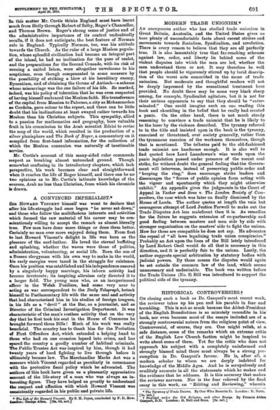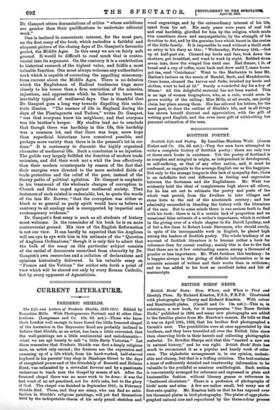HISTORICAL CONTROVERSIES.t ON closing such a book as Dr. Gasquet's
most recent work, the reviewer takes up his pen and his parable in fear and trembling. This is not so much because the Abbot-President of the English Benedictines is so minutely recondite in his book, nor even because most of the essays included are of a. strongly controversial nature from the religious point of view. Controversial, of course, they are. One might relish, at a safe distance, some of the remarks which an extreme critic of the English Low Church faction might be inspired to write about some of them. Yet for the critic who does not approach his subject with a completely uninformed and strongly biassed mind there must always be a strong pre- sumption in Dr. Gasquet's favour. He is, after all, a modern scholar to whom we are deeply indebted for knowledge of the Middle Ages. And he is scrupulously and eruditely accurate in all the statements which he makes and. the evidence that he adduces. It is this accuracy that makes the reviewer nervous. Nor is the fear relieved by the final essay in this work, on "Editing and Reviewing," wherein
• The Tyranny of Trade Unions. By One Who Resents It. London: E. Nash. [1s. net.] t Eng:and unclzr the Ceti Rcien, and other Rtrays. By Francis Aidan. Gasquet, D.D. London: G. Bell and Sous. [6s. net.]
Dr. Gasquet utters denunciations of critics "whose ambitions are greater than their qualifications to undertake editorial work."
One is inclined to concentrate interest, for the most part, on the first essay of the book, which embodies a faithful and eloquent picture of the closing days of Dr. Gasquet's favourite period, the Middle Ages. In this essay we are on fairly safe ground. It would be difficult to read much that is contro- versial into its argument. On the contrary it is a contribution to historical research of the highest value, and fulfils a most valuable function. One must always welcome any authoritative work which is capable of correcting the appalling misconcep- tions current about the Middle Ages. There is no delusion which the Englishman of Radical tendencies hugs more closely to his bosom than a firm conviction of the miseries, injustices, and oppressions which he believes to have been inevitably typical of mediaeval days. One is thankful that Dr. Gasquet goes a long way towards dispelling this unhis- toric illusion. "The essence of life in England during the days of the Plantagenets and Tudors," writes Dr. Gasquet, "was that everyone knew his neighbour, and that everyone was his brother's keeper. My studies lead me to conclude that though there was hardship in this life, this hardship was a common lot, and that there was • hope, more hope than superficial historians have conceived possible, and perhaps more variety than there is in the peasant's lot in our time." It is customary to discount the highly organized character of mediaeval life. Such a conclusion is an injustice. The guilds very largely fulfilled the function of modern trade unionism, and did their work not a whit the less effectively than their modern counterparts by reason of the fact that their energies were directed to the more secluded fields of trade protection and the relief of the poor, instead of the thorny paths of political agitation. Dr. Gasquet is emphatic in his treatment of the wholesale charges of corruption in Church and State urged against mediaeval society. That instances of such existed is undeniable, but, to quote the words of the late Mr. Brewer, "that the corruption was either so black or so general as party spirit would have us believe is contrary to all analogy and is unsupported by impartial and contemporary evidence."
Dr. Gasquet's first essay is such as all students of history must welcome. In the remainder of his book he is on more controversial ground. His view of the English Reformation is not our view. It can hardly be expected that the Anglican will see eye to eye with him in his estimate of the "Question of Anglican Ordinations," though it is only fair to admit that the bulk of the essay on this particular subject consists of the recital of documents unearthed from obscurity by Dr. Gasquet's own researches and a collation of declarations and opinions historically delivered. In his valuable essay on "Fiance and the Vatican" the author sets forth a point of view which will be shared not only by every Roman Catholic, but by every opponent of Agnosticism.



























































 Previous page
Previous page